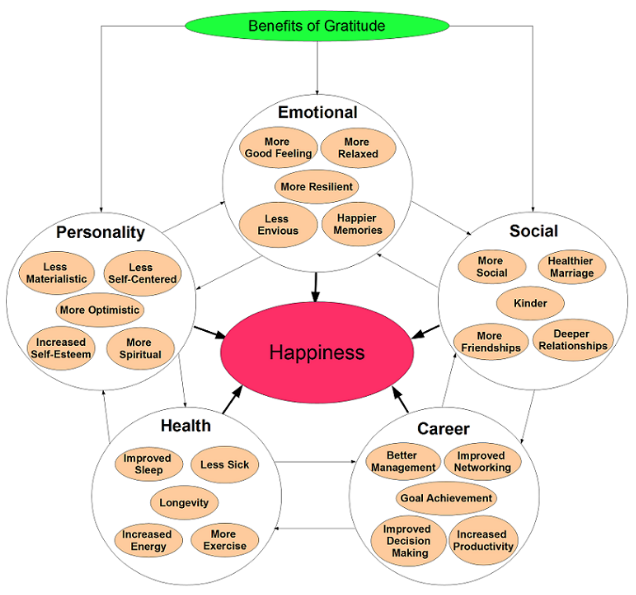Gratitude
Do you want more from your life?
More happiness? Better health? Deeper relationships? Increased productivity?
What if I told you that just one thing can help you in all of those areas?
There is a variety of things that can conjure positive feelings of appreciation, or gratitude.
A well thought out Thank You, instead of a half-hearted, “Thanks,” often leaves people feeling pretty good. Perhaps there was a moment that you can reflect on, that involved strong feelings of gratitude?

Gratitude is an emotion similar to appreciation that most people are familiar with. What many people do not know is that gratitude played an important role in several historical movements. Gratitude is now becoming an important part of psychology research, especially positive psychology.
Purpose of Gratitude
When talking about being grateful people often respond as if they don’t have anything to be grateful for, because they have not achieved their dreams; the fulfilling job, the perfect wife/husband, the beautiful house, or they are unhealthy and/or unsatisfied with their body.
While it can be hard to avoid self-pity entirely, mentally strong people choose to exchange self-pity for gratitude. Whether you choose to write a few sentences in a gratitude journal, or simply take a moment to silently acknowledge all that you have, giving thanks. People can use gratitude to form a new life, or to build upon and make current one better.
Even though life is not perfect it can still be great. And gratitude is the first step to create the change.
“Gratitude is the healthiest of all human emotions. The more you express gratitude for what you have, the more likely you will have even more to express gratitude for.” —Zig Ziglar
What people focus on is what they will see the most and attract to their lives. When someone points out a red car on the street, we focus on it and will most likely notice a lot of red cars that day. This applies to our food choices too! When we focus on what should not be eaten, all the mind thinks is to eat that food. Focusing on the healthy choice itself helps to bring about more healthy changes.
Being grateful for the little things in life can improve the way we perceive life. People may feel gracious by being grateful because it can be an intrinsically rewarding process. Simply being grateful for being alive is a great way to motivate oneself to seize the day.
“Learn to be thankful for what you already have, while you pursue all that you want.” —Jim Rohn

Benefits of Gratitude
- Gratitude opens the door to more relationships. Not only does saying “thank you” constitute good manners, but showing appreciation can help you win new friends. Thanking a new acquaintance makes them more likely to seek an ongoing relationship. So whether you thank a stranger for holding the door or send a thank-you note to that colleague who helped you with a project, acknowledging other people’s contributions can lead to new opportunities.
- Gratitude improves physical health. Grateful people experience fewer aches and pains and report feeling healthier than other people. Not surprisingly, grateful people are also more likely to take care of their health. They exercise more often and are more likely to attend regular check-ups, which is likely to contribute to further longevity.
- Gratitude reduces a multitude of toxic emotions, from envy and resentment to frustration and regret. Robert Emmons, a leading gratitude researcher, has conducted multiple studies on the link between gratitude and well-being. His research confirms that gratitude effectively increases happiness and reduces depression.
- Grateful people sleep better. Spend just 15 minutes jotting down a few grateful sentiments before bed, and you may sleep better and longer.
- Gratitude improves self-esteem. Rather than becoming resentful toward people who have more money or better jobs—a major factor in reduced self-esteem—grateful people are able to appreciate other people’s accomplishments.
- Gratitude increases mental strength. Gratitude not only reduces stress, also play a major role in overcoming trauma. Recognizing all that you have to be thankful for —even during the worst times—fosters resilience.


